Knitting: A therapy and an income source for refugees
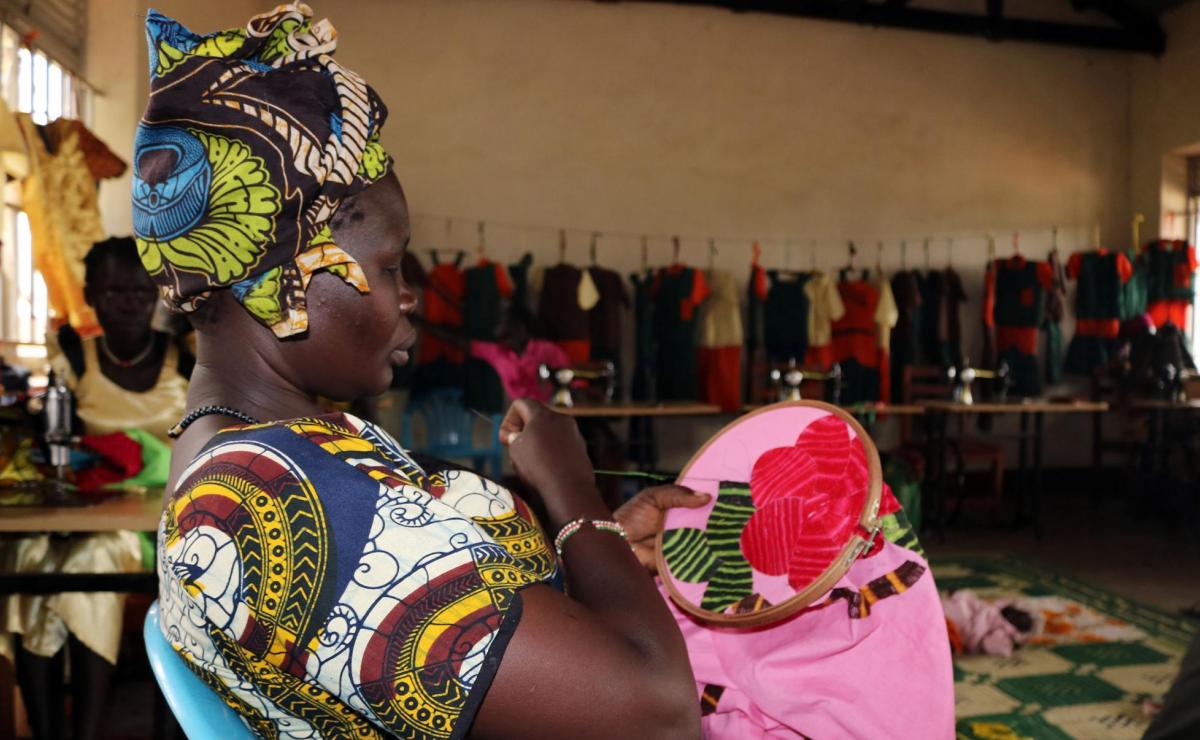
Did you know that knitting is therapeutic? Yes, it is! The craft is magically healing emotional distress for some Congolese and South Sudanese refugees in Uganda’s settlements. Refugees engaging in the craft claim that it helps them calm their anxiety and forget about their problems which improves their mental health.
According to their testimonies, knitting enhances relaxing, meditative qualities, and helps them live healthier and, happier lives.
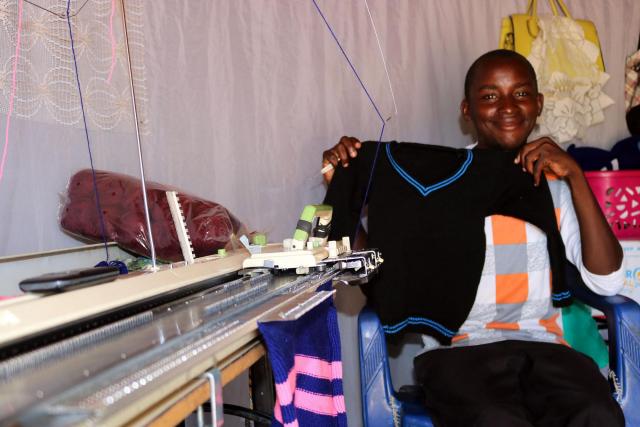
How knitting helps refugees relieve stress and anxiety
21-year-old Junior Wani is a South Sudanese refugee in Boroli Settlement. He suffered an alcohol addiction for almost a year after he lost all his property to the war in South Sudan, and had to seek refuge in Uganda.
“Alcohol became my stress reliever, I found comfort in it and resorted to binge drinking.” “It always gave me relief but destroyed my life in turn.” Explains Wani who spent his days drunk and as a result, he neglected his wife and son. This was the life Wani lived until he was enrolled for vocational training in knitting, an activity implemented by the Lutheran World Federation (LWF) with funds from USA’s Bureau of Population, Refugees, and Migration (PRM).
Enrolling for knitting classes was a milestone for Wani as it has greatly improved his state of mind, emotions and also led him back to soberness.
“When I enrolled for knitting, I got busy spending my time engaging in a productive activity. The craft has kept me away from pondering about my worries, problems and also helped me stay away from my peers with whom I used to engage in alcohol abuse. Knitting has brought me back to soberness.” Says Wani.
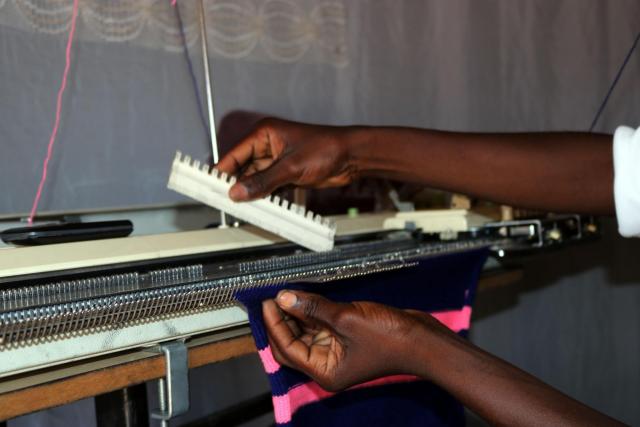
Wani explains that knitting involves creating patterns which require utmost focus. “The focus required to create patterns is a mental exercise that helps one forget about everything else and prioritize creating a perfect cloth piece.” He explains that knitting involves following and identifying patterns, learning new stitches and using both hands. The craft also requires one’s efforts to improve fine motor skills while keeping the mind active and engaged in the activity.
According to the Benson-Henry Institute for Mind-Body Medicine at Massachusetts General Hospital, the repetitious movements in knitting stimulate the relaxation response, the body’s counterbalance to stress and a state in which the heart rate and blood pressure fall, breathing slows and levels of stress hormones drop.
Graal Bukombo is a Congolese refugee and knitter in Rwamwanja settlement who explains the craft has helped him alleviate depression, anxiety and also boredom as it keeps him busy. “I never feel lonely or isolated because am always busy.” Bukombo continues to say that the craft provides him a sense of satisfaction and accomplishment when pieces are perfectly done and appreciated by people in addition to fetching him an income.
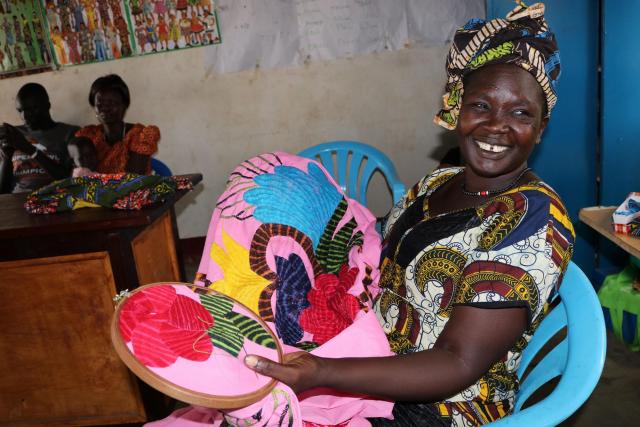
Knitting is a source of income
Knitting is a source of income. Knitters craft cloth pieces that they sell for a living. A number of refugees and host community residents have enrolled for vocational training in knitting implemented by LWF with funds from PRM. Jennifer Adong, a Project Manager with LWF explains that trainees are taught to knit and are given free access to knitting supplies. “The support is aimed at equipping them with a life skill through which they can earn a living for self-sustenance.”
Trained knitters craft clothes like sweaters, shawls, shoes among others that they sell for a living. “I make sweaters for school children, shawls and woven clothes to be worn by people of all ages during cold seasons.” Says Bukombo.
Knitting fetches Wani at least UGX 400,000 a month which is enough to meet his family’s financial demands. “My family gets enough food, my boy goes to a private school and we rent accommodation in a decent neighborhood in the host community.”
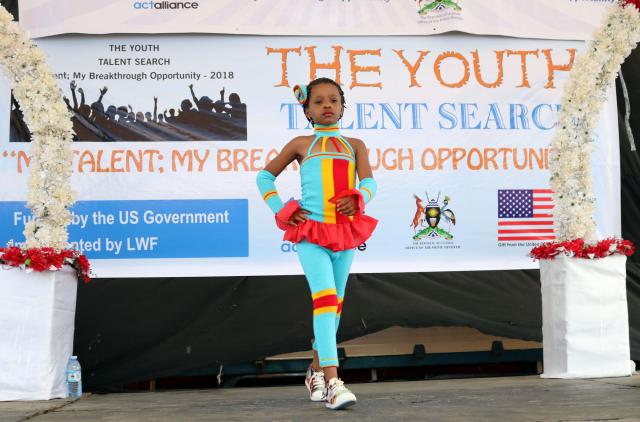
Bukombo says he earns enough to provide for his family’s basic needs. He is also saving some of his income to establish a Fashion House in the settlement that will produce fine woven clothes for people of all ages and also train those who wish to learn the skill.
With an income, Wani, Bukombo and their families live better and happier lives as they can afford basic needs and more. This is unlike before when they had just arrived in the refugee settlements, left with nothing and had to exclusively depend on charity.
South Sudanese refugees are forced out of their countries by various reasons like; conflict and violence, fear for persecution, famine and hunger among others. Majority of these arrive in Uganda with nothing. To ensure that they rebuild their lives, the Government of Uganda allows them a right to work for a living. Humanitarian organizations like LWF support them with trainings in business skills, management and also offer them business start-up kits to ensure that they work and earn money for self-sustenance.

